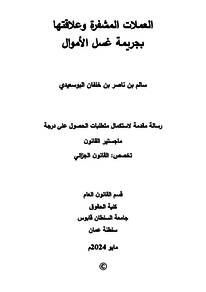Document
المسؤولية الجزائية عن جرائم تقنيات الذكاء الاصطناعي : دراسة تحليلية مقارنة.
Source
رسالة ماجستير
Other titles
Criminal responsibility for artificial intelligence crimes
Country
عمان
City
إبراء
Publisher
جامعة الشرقية
Gregorian
2024
Language
Arabic
Subject
Thesis Type
رسالة ماجستير
English abstract
This study examines and analyzes the aspect of criminal liability for artificial intelligence crimes, with the aim of studying and analyzing jurisprudential theories and comparative laws that conceptualize the new criminal liability for artificial intelligence systems. The importance of the study lies in addressing one of the most prominent legal issues created by crimes committed by artificial intelligence technologies that is the determination of criminal liability. The issue of the research is to clarify the alignment of general penal rules in the face of AI crimes. The study reviews the recent jurisprudential trend that calls for recognizing AI entities with legal personality and criminal liability. The study also analyzes the theory of the legal deputy introduced by the European Parliament in 2017 as part of the European civil law in Robotics, and then analyzes the position of national and comparative legislation on criminal liability for AI crimes. The study concludes with an important conclusion that AI technologies, despite their advanced capabilities, lacks cognition as an essential element for the criminal capacity of persons. The Omani and Emirati legislatures place criminal liability in using AI systems to commit crimes as the use of any other tool in committing a crime.
Keywords: artificial intelligence technologies, criminal liability, artificial intelligence crimes, legal personality, criminalization and punishment policy.
Origin
جامعة الشرقية
Arabic abstract
تتناول هذه الدراسة بالبحث والتحليل جانب المسؤولية الجزائية عن جرائم تقنيات الذكاء الاصطناعي، بهدف دراسة وتحليل النظريات الفقهية والقوانين المقارنة التي تضع تصوّرًا للمسؤولية الجزائية المستحدثة لأنظمة الذكاء الاصطناعي، وتكمن أهمية الدراسة في تناولها أحد أبرز الإشكاليات القانونية التي خلّفتها الجرائم المرتكبة باستخدام تقنيات الذكاء الاصطناعي المتمثلة في تحديد المسؤولية الجزائية عنها. وتتمثل مشكلة البحث في توضيح مدى ملائمة القواعد الجزائية العامة في مواجهة جرائم تقنيات الذكاء الاصطناعي. وتستعرض الدراسة الاتجاه الفقهي الحديث الذي ينادي للاعتراف لكيانات الذكاء الاصطناعي بالشخصية القانونية والمسؤولية الجزائية. كما تحلل الدراسة نظرية النائب القانوني التي طرحها البرلمان الأوروبي عام 2017م ضمن القواعد الأوروبية التوجيهية للروبوت في القانون المدني، ثم تحلل موقف التشريع الوطني والتشريعات المقارنة من المسؤولية الجزائية عن جرائم الذكاء الاصطناعي. وتخلص الدراسة إلى نتيجة مهمة وهي أن تقنيات الذكاء الاصطناعي رغم قدراتها المتطورة تفتقر للإدراك كعنصر أساسي لتوافر الأهلية الجزائية للأشخاص، وأن المشرعين العُماني والإماراتي يُبقيا المسؤولية الجزائية عن استخدام أنظمة الذكاء الاصطناعي في ارتكاب الجرائم كحال استخدام أي آلة أخرى في ارتكاب الجريمة.
الكلمات المفتاحية: تقنيات الذكاء الاصطناعي، المسؤولية الجزائية، جرائم تقنيات الذكاء الاصطناعي، الشخصية القانونية، سياسة التجريم والعقاب.
الكلمات المفتاحية: تقنيات الذكاء الاصطناعي، المسؤولية الجزائية، جرائم تقنيات الذكاء الاصطناعي، الشخصية القانونية، سياسة التجريم والعقاب.
Category
Theses and Dissertations







